A recent advisory issued by the health ministry to various states and union territories asks for delayed administration of the popular medicine ‘oxytocin’ to women at the time of childbirth, as per reports.
To be specific, doctors and medical staff are now advised to give oxytocin only after the placenta has been delivered. This could take up to 15-30 minutes after the delivery of the baby — and that's where it becomes problematic.
The World Health Organisation (WHO) advises giving oxytocin ‘immediately after the birth of the baby’. Countries, including India, have been following this global standard ever since.
The debate becomes clear when we look into the need for oxytocin and the functions it performs. More importantly, what happens when it is not given on time?
Why Oxytocin?
Uterotonics are agents given to women in the third stage of labour (after the delivery of the baby and until the expulsion of the placenta) to induce contractions and prevent postpartum haemorrhage (PPH).
The WHO explains, "Postpartum Haemorrhage is commonly defined as a blood loss of 500 ml or more within 24 hours after birth. PPH is the leading cause of maternal mortality in low-income countries and the primary cause of nearly one quarter of all maternal deaths globally."
PPH risk can be brought down by around 70 percent with timely oxytocin delivery.
So let's get this straight: PPH is the leading cause of maternal mortality globally, and failure of the uterine to contract adequately (uterine atony) is the most common reason behind it. Naturally, the solution stems from inducing uterine contractions — and administering oxytocin immediately is one of the ways to do just that.
So why does the advisory say otherwise?
The Study
The government's recommendations are based on a study conducted on women and babies in a district in Gujarat, along with a few in a Kolkata hospital. The impact of delayed cord blood clamping and delayed oxytocin delivery showed benefits like smooth initiation of breastfeeding and better immunity and cognitive development in babies.
The News Minute quotes study researcher Dr Arun Singh, who is also an advisor with the Centre on Rashtriya Bal Swasthya Karyakram.
Further, he said that most women do not need artificial oxytocin because naturally produced oxytocin, which the mother herself produces, is "far superior".
But can we base a nationwide policy on a single study that contradicts universal standards? FIT speaks to several doctors for their takes.javascript:void(0)
"It's Very Surprising", Say Doctors
Dr Mamta Pattnayak is consultant of Gynaeocology at Fortis Gurugram. She says that oxytocin is to be delivered immediately after the delivery of the baby without fail. It is needed to facilitate uterinal contractions and smoothen the labour process. Waiting for the placenta to be released makes no sense, especially as she makes this point:
Dr Puneet Bedi is a gynecologist and obstetrician at Apollo Hospitals, New Delhi. He thinks on the same lines, "Delaying the drug could be fatal to women. We have been using uterotonics since time immemorial to prevent bleeding. It's a life-saving medicine."
But what about the study? Dr Anu Vig, Consultant, Obstetrician and Gynaecologist at Motherhood Hospital, Mumbai, highlighted the limitations of the research. "I don't know how they have come up with these recommendations. It's very surprising. These are totally against the global standards. It's like a 360 degree turn."
She adds that the drug is life-saving and preventive as long as it is given on time. It cannot do its job if it's not administrated at the right time.javascript:void(0)
Dr Rishma Pai, immediate past president of Indian Society for Assisted Reproduction, emphasized that research is now leaning more towards prevention rather than treatment, making timely oxytocin even more important. “Patients keep bleeding until the uterine starts contracting. So it just makes more sense to engage in active management of labor through oxytocin, which will augment the delivery of the placenta. We have been using it for years, and there are no associated harms with it.”
FIT also spoke to Dr Gandhali Deorukhar, Gynecologist at Wockhardt Hospital. She echoed the vews of all other doctors when she said, "We definitely want to give oxytocin as soon as the anterior shoulder of the baby is out."
Notably, this is not the first time that the drug has come under the government’s scanner. The Centre has been trying to ban its manufacture by private firms and make state-run Karnataka Antibiotics and Pharmaceuticals Ltd. (KAPL) the sole manufacturer and supplier. The reason cited is to prevent oxytocin misuse in dairy farming (lactation enhancer and milk inducer) and agriculture. The Supreme Court has currently referred the issue to a larger bench.

